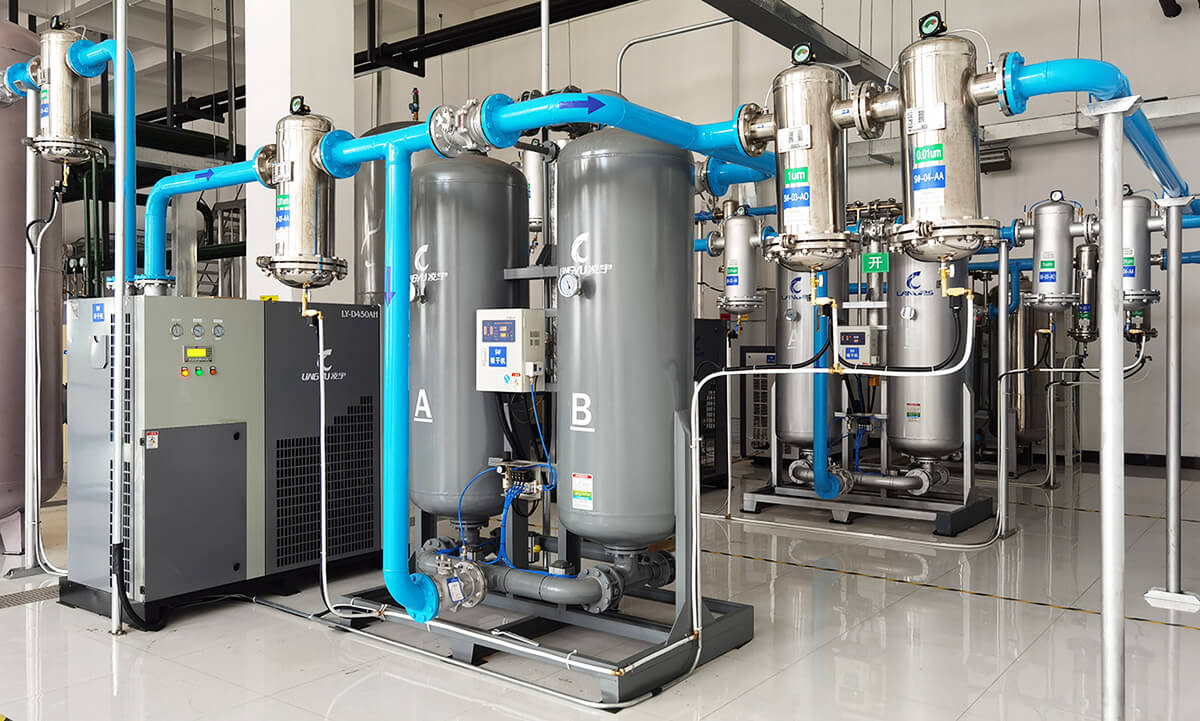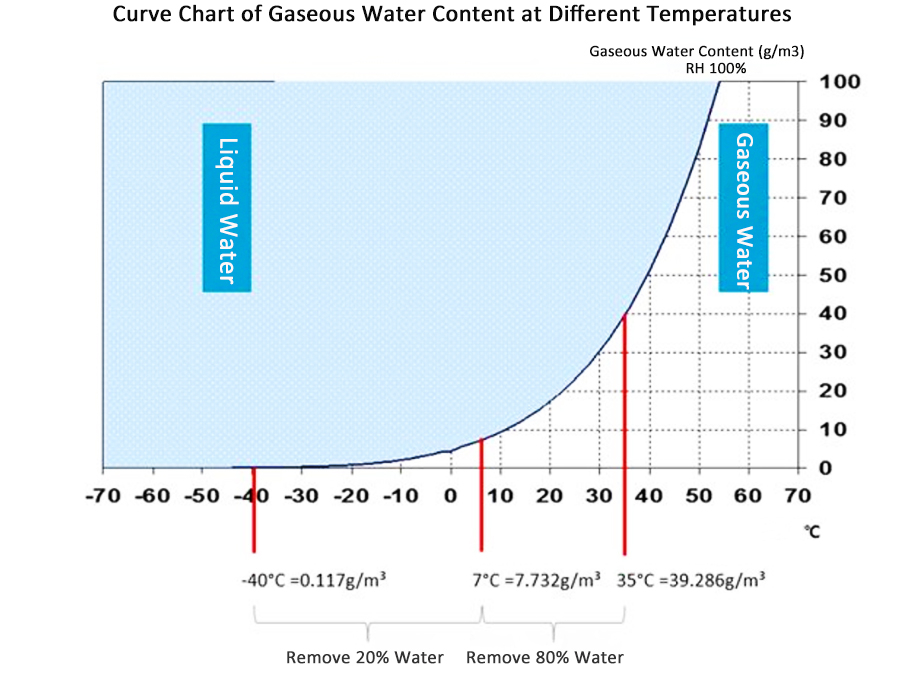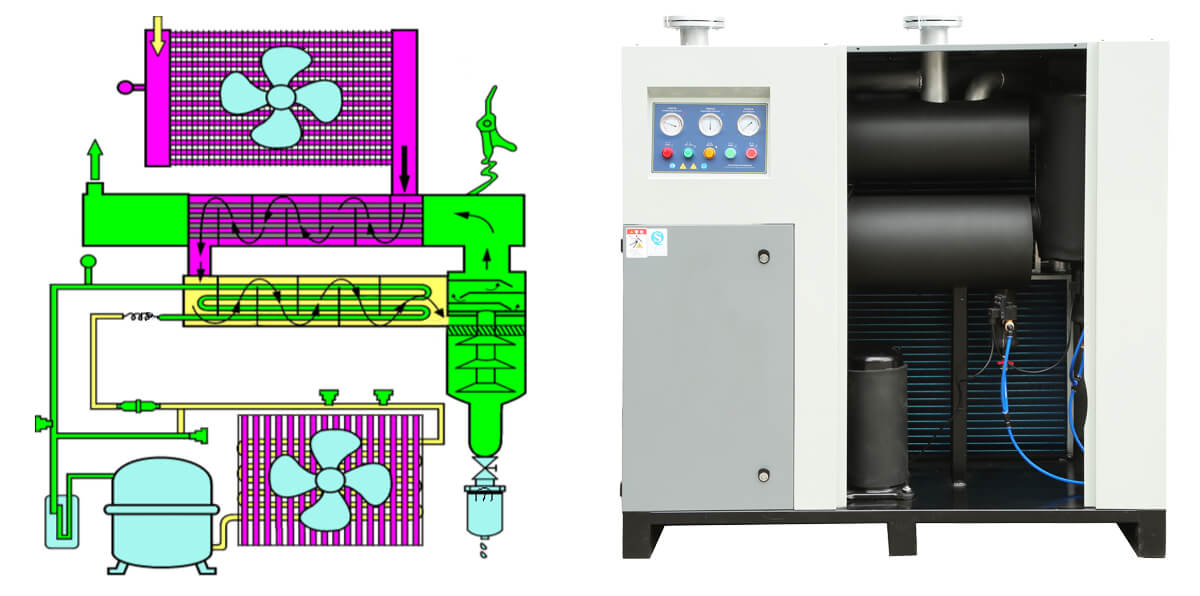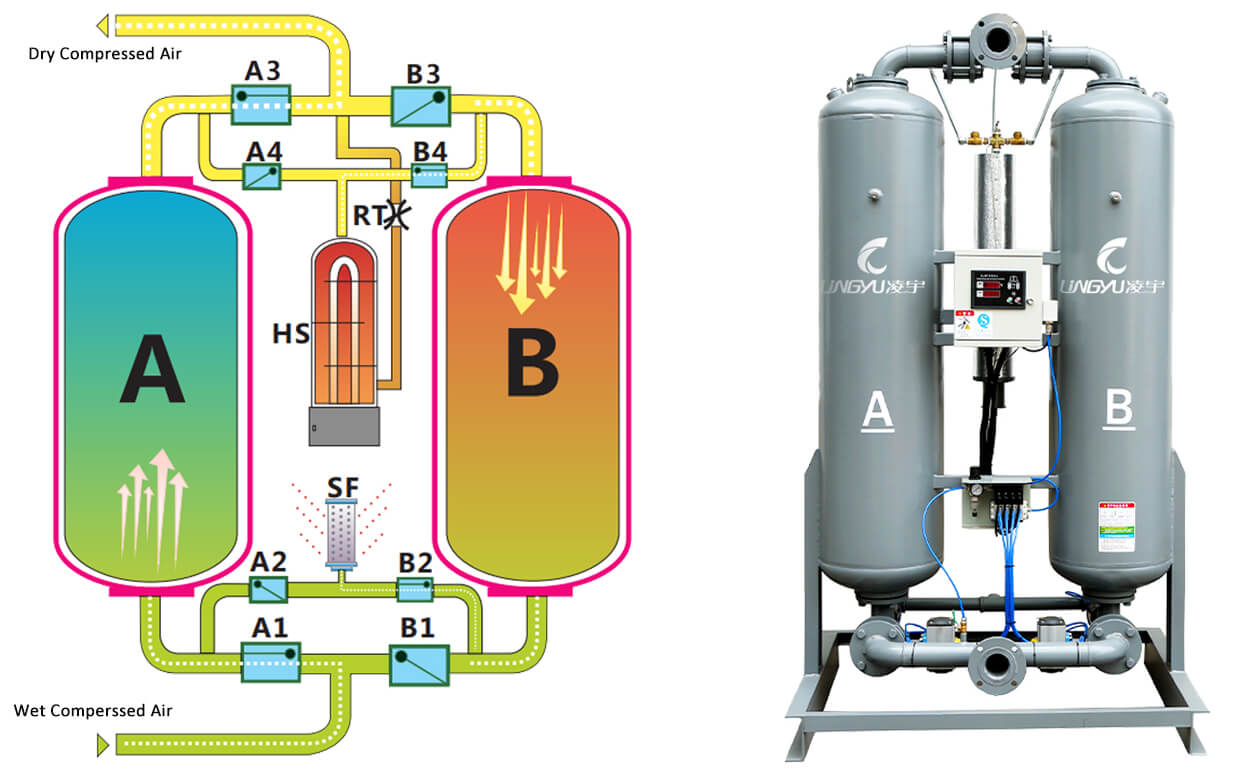Compressed air is used in a variety of industries. We need clean and dry air. However, after the air compressor compresses the air, it will produce condensate. At the same time, it contains a lot of particulate impurities, oil vapors and so on. These can affect air quality. Besides, it will bring all kinds of problems. On the one hand, it will increase the operation and maintenance costs of various components. On the other hand, they can contaminate the product. Therefore, it is absolutely necessary to treat the air source. This is why we need the air dryers for compressed air.

What is Compressed Air Dryer?
There is an industry standard for compressed air quality. Namely ISO8573-1:2010. It stipulates six grades of pressure dew point (PDP) from -70°C to 10°C. The lower the PDP number, the higher the air quality requirements. So compressed air is drier. And only the dryer can help meet this standard.
| Air Quality Class | Solid Particulate Size (μm) | Pressure Dew Point (℃) | Oil Content in Air (mg/m³ or ppm) |
| 0 | — | — | — |
| 1 | 0.1 | -70 | 0.01 |
| 2 | 1 | -40 | 0.1 |
| 3 | 5 | -20 | 1 |
| 4 | 15 | +3 | 5 |
| 5 | 40 | +7 | 25 |
| 6 | — | +10 | — |
Compressed air treatment equipment includes the following parts: after cooler, filter, compressed air dryer, air receiver tank, etc. The dryer is the most important of these. Its function is to dry compressed air. It can remove water vapor in a variety of ways. For example, use the pressurization, cooling, adsorption, penetration and other methods. Moreover, separate liquid moisture by heating, filtering, mechanical separation. In fact, air dryer for compressed air can also eliminate some dust and oil.
Air Dryers Type For Compressed Air
As mentioned above, there are different technologies for dryers. Therefore, there are various air compressor dryer types. There are generally three types of dryers. That is, refrigerated dryer, desiccant air dryer and membrane dryer. Water will change from liquid to solid at temperatures below 0°C. That is, freezing. Therefore, the refrigerant dryer cannot achieve a drying effect below 0°C. At this time, it is necessary to choose an adsorption dryer or a membrane dryer.
| Compressed Air Quality Grade | Pressure Dew Point (PDP) (℃) | Compressed Air Dryer Type Choice |
| 0 | —— | —— |
| 1 | ≤-70 | Desiccant Air Dryer |
| 2 | ≤-40 | Desiccant Air Dryer |
| 3 | ≤-20 | Desiccant or Membrane Dryer |
| 4 | ≤3 | Refrigeration Air Dryer |
| 5 | ≤7 | Refrigeration Air Dryer |
| 6 | ≤10 | Refrigeration Air Dryer |
① Refrigerated Air Dryer For Compressed Air
It cools the compressed air. Lower the pressure dew point to 3~10℃. Condenses water vapor into liquid water. Finally separates it for discharge. So achieve the purpose of drying compressed air. It is the most common type of dryer. 3°C (38°F) is the practical lower limit for refrigerant dryers. This is because the lower temperature may freeze the water.
There are also several types of refrigerant dryers. For example, it includes cycling and non-cycling air dryer. There is also vsd variable speed refrigeration air dryer. Among them, non-cycling air dryer is the most common type.
② Adsorption Desiccant Air Dryer
Moist air flows through the air dryer desiccant. They are usually silica gel, molecular sieve and activated alumina. They absorb moisture from the air. Thus the air is dried. Obtain dry compressed air with a pressure dew point below 0°C.
According to the ISO8753 standard, there are usually three specifications. That is -20°C, -40°C, -70°C. After the desiccant beads absorb water vapor, it needs regular regeneration to restore the drying capacity. There are several methods for regeneration. So there are several types of desiccant air dryers. They are as follows:
Heatless air dryer;
Heat purge desiccant air dryer;
Blower purge desiccant air dryer;
HOC type air dryer (heat of compression);
③ Membrane Dryer
It has many tiny hollow fiber tubes inside. These fibrous tubes are selectively permeable. Compressed air flows through the inside of these tiny fiber tubes. The water vapor inside will penetrate the membrane wall. However, air continues to pass inside. Thereby achieving the purpose of separating and removing water.
Membrane dryer can reach the pressure dew point of -20℃~3℃. Moreover, it is easy to operate. There are few installation restrictions. Run silently.
How Does Air Dryer Compressed Air Work?
Compressed air dryers work on a variety of working principles. But all of them dry and remove water by reducing the pressure dew point (PDP).

There are 2 indicators for the dryness of compressed air. One is relative humidity (RH). Another is pressure dew point (PDP). The lower the RH, the less water vapor it contains. That is, the compressed air is drier. So the lower the relative humidity (RH) of the air, the better.
PDP: The amount of water vapor in compressed air at a certain temperature is limited. It will reach saturation. The lower the temperature, the lower the max water vapor content. Use air dryer compressed air to lower the pressure dew point (PDP). For example, lower the PDP to 7°C. At this time, the max water vapor content is 7.732g/m3.
Then heat the compressed air to ambient temperature (eg 25°C). At this time, the max water vapor content is 22.830g/m3. So the relative humidity RH=7.732/22.830=33.87%.
The compressed air drops from 100% RH at the outlet of the air compressor to 33.37%. So it achieves the purpose of drying.
(1) Refrigerated Compressed Air Dryer Working Principle
There is a correspondence between the saturated vapor pressure of water and the temperature. Use a refrigeration system to reduce the temperature of the compressed air. Make water vapor supersaturated and condense at low temperature. Finally the air is dried.

The refrigeration air dryer adopts the principle of cooling and removing water. It mainly consists of two parts. Namely heat exchange system and refrigeration system. Firstly the air is pre-cooled by an air-to-air heat exchanger. Here, the air temperature will drop a part.
Afterwards, they enter into the air-to-refrigerant heat exchanger. That is, the evaporator. Here, the refrigerant liquid absorbs heat from the air. So refrigerant liquid becomes a gaseous state. At the same time, the temperature of the air is further reduced. The temperature will be reduced to 0°C-10°C. At this time, the moisture in the air will come out at this temperature. The separator then separates the air from water and impurities. Finally, auto drain will get the water out of refrigerated dryer.
In this way, we get low temperature and dry compressed air. But the air is not output directly. They go back to the heat exchanger. Here the temperature rises. Then leave the refrigerant compressed air dryer.
In addition, the refrigerant returns to the compressor. Then it starts a new cycle of refrigeration. So this is the working principle of non-cycling refrigerated compressed air dryer.
If it’s cycling air dryer, the structure will be a bit different. It has an extra water accumulator and liquid temperature controller. So it can control the start and stop of refrigerant compressor. The same is true for vsd refrigeration air dryer. There is a inverter in it. Both of them can adapt to the load change. Therefore, it can save energy.
(2) Working Principle of Desiccant Air Dryer For Compressed Air
The adsorption dryer working principle includes two parts. One is the adsorption process. Another is the regeneration process.
① Adsorption
Water vapor in the compressed air diffuses to the air dryer desiccant. Adsorbents are porous structure. So the water vapor will be adsorbed. At the same time, there will be thermal motion and collision of molecules. Some of the water molecules will leave the adsorbent surface. They go back into the airflow. At a certain moment, the number of adsorbed water molecules is the same as the number of water molecules leaving. At this time, it reaches adsorption equilibrium.
② Regeneration
It means that the air dryer desiccant recover the adsorption ability. There are mainly 4 regeneration methods. That is, heatless, heat purge, blower purge and compression heat regeneration.
1) Heatless compressed air dryer: uses part of dry air to remove moisture in the adsorbent.
2) Heat purge air dryer for compressed air: Properly heat the regeneration air. Increase regeneration air temperature. So it can reduces some air consumption.
3) Blower purge dryer for compressed air: firstly, the blower draws in ambient air. Then heater heats the air. Then desorb moisture from the adsorbent.
4) Heat of compression dryer: uses the waste heat from air compressor to purge desiccant beads.

③ How does desiccant compressed air dryer work?
Here we use a micro heated purge air dryer as an example. Explain how the desiccant compressed air dryer works in detail.
1) Adsorption drying process of the dryer
The wet compressed air enters the drying tower. They pass through the adsorbent of tower A. The desiccant pellets adsorb the water vapor into its capillary pores. This process will continue all the time. And it will be until the regeneration tower finishes regenerating and filling with pressure. Then only the cycle switching starts.
2) Dryer regeneration process (desorption or reduction)
The regeneration process consists of at least 6 steps: pressure relief → hot purge → cold purge → pressure boost → standby → TSE dew point energy saving control → process switch
- Pressure relief process: Firstly, must relive pressure of regeneration tower to atmospheric pressure. You can hear the pressure release sound from the silencer.
- Hot purge process: use about 3~8% dry compressed air to purge the desiccant beads. And the heater will heat the air firstly. It can remove the water.
- Cold purge process: use about 3~8% compressed air to purge the desiccant beads. The heater will stop working. It can reduce the temperature of adsorbent.
- Boosting process: the regeneration vent valve is closed. Part of the air is gradually pressurized up through the throttle valve. And reaches the operating pressure.
- Backup process: The regeneration tower has been pressurized. Wait for switching.
- TSE dew point energy saving control process: Rely on the actual dew point of the outlet to implement dynamic control. It can save the regeneration energy to the greatest extent.
- Switch process: twin towers work switch.
So above is the working principle of heat purge desiccant compressed air dryer.
(3) Membrane Dryer Working Principle
It works on the principle of osmosis. Its core component is the membrane module. Components are usually composes of multilayer film materials. It includes a polyester film and a polyamide film. These membrane materials are highly selective. So it can separate the moisture. At the same time, retain other gases.
Humid air enters the membrane dryer. Firstly, they go through a pre-filter. Remove dust and impurities from the air. Secondly, air enters the membrane module. The membrane material has a screening effect. Separate the water. And dry compressed air comes out the other side.
So above is about how compressed air dryers work.
